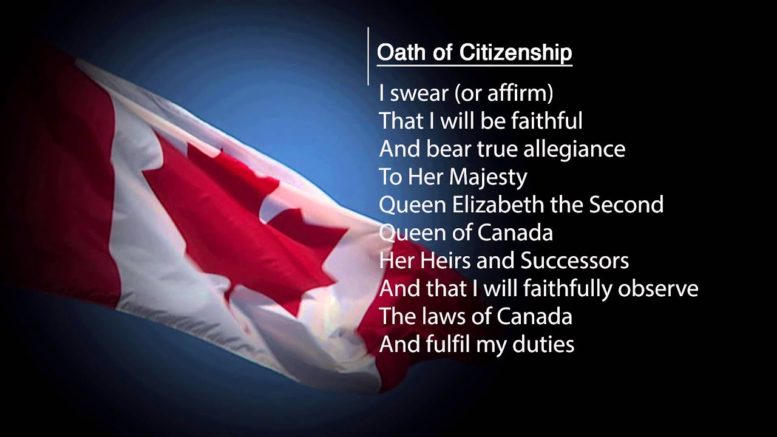(Ottawa) – The government of Canada is taking to steps to change Canada’s Oath of Citizenship to include a clear reference to the rights of Indigenous peoples.
On May 28, 2019 Minister of Immigration, Refugees and Citizenship, Ahmed Hussen introduced Bill C-99, An Act to amend the Citizenship Act.
The proposed amendment to the Oath reflects the Government of Canada’s commitment to reconciliation, and a renewed relationship with Indigenous peoples based on recognition of rights, respect, cooperation and partnership. It also demonstrates the Government’s commitment to responding to the Calls to Action of the Truth and Reconciliation Commission.
“The change to the Oath is an important step on our path to reconciliation with Indigenous peoples in Canada,” stated Minister Hussen.
“It will encourage new Canadians to learn about Indigenous peoples and their history, which will help them to fully appreciate and respect the significant role of Indigenous peoples in forming Canada’s fabric and identity.”
The new proposed language adds references to Canada’s Constitution and the Aboriginal and treaty rights of First Nations, Inuit and Métis peoples:
“I swear (or affirm) that I will be faithful and bear true allegiance to Her Majesty Queen Elizabeth the Second, Queen of Canada, Her Heirs and Successors, and that I will faithfully observe the laws of Canada, including the Constitution, which recognizes and affirms the Aboriginal and treaty rights of First Nations, Inuit and Métis peoples, and fulfil my duties as a Canadian citizen”.
Taking the Oath of Citizenship is the last step before receiving Canadian citizenship. The Oath of Citizenship is a solemn promise to follow the laws of Canada and to perform the new citizen’s duties as a Canadian citizen. It is a public declaration that the new citizen is joining the Canadian family and that the new citizen is committed to Canadian values and traditions.
“The Truth and Reconciliation Commission’s Calls to Action are an important roadmap for all levels of government, civil society, education and health care institutions, and the private sector to ensure Indigenous people included as we build a stronger Canada together,” stated Minister of Crown-Indigenous Relations, Carolyn Bennett.
“The change to the Oath of Citizenship introduced today responds to Call to Action No. 94 and demonstrates to all Canadians, including to our newest citizens, that Indigenous and treaty rights are not just important to Canada— they are an essential part of our country’s character.”
“Reconciliation with First Nations, the Inuit and the Métis is not only an Indigenous issue; it’s a Canadian issue,” added Minister of Indigenous Services Seamus O’Regan. “It will take partners at all levels to move reconciliation forward. Today, we are advancing that partnership by proposing that all Canadians make a solemn promise to respect Indigenous rights when they recite the Oath of Citizenship.”
“I welcome the Government’s new legislation to change the Oath of Citizenship to better reflect a more inclusive history of Canada, as recommended by the Truth and Reconciliation Commission in its final report,” noted Senator Murray Sinclair.
“To understand what it means to be Canadian, it is important to know about the three founding peoples—the Indigenous people, the French and the British.
“Reconciliation requires that a new vision, based on a commitment to mutual respect, be developed. Part of that vision is encouraging all Canadians, including newcomers, to understand the history of First Nations, the Métis and the Inuit, including information about the treaties and the history of the residential schools, so that we all honour the truth and work together to build a more inclusive Canada.”
Quick facts:
- The Truth and Reconciliation Commission’s Final Report states: “Precisely because ‘we are all Treaty people,’ Canada’s Oath of Citizenship must include a solemn promise to respect Aboriginal and Treaty rights”.
- The Government consulted extensively with national Indigenous organizations on amendments to the Oath of Citizenship.
- Section 35 of the Constitution Act, 1982 recognizes rights – including both Aboriginal rights and treaty rights – of Indigenous peoples (section 35 speaks of the Aboriginal peoples of Canada). Section 35 protects the practices and customs that are at the centre of Indigenous culture and traditions. The rights covered by section 35 include hunting and fishing rights, land rights and self-government rights.
- Canada supports the United Nations Declaration on the Rights of Indigenous Peoples. The Declaration recognizes Indigenous peoples’ human rights, as well as rights to self-determination, language, equality and land.
- Today, more than 1.6 million people, or nearly 5% of Canada’s population, are Indigenous.



Be the first to comment on "Feds propose change to the oath of citizenship to recognize Indigenous rights"